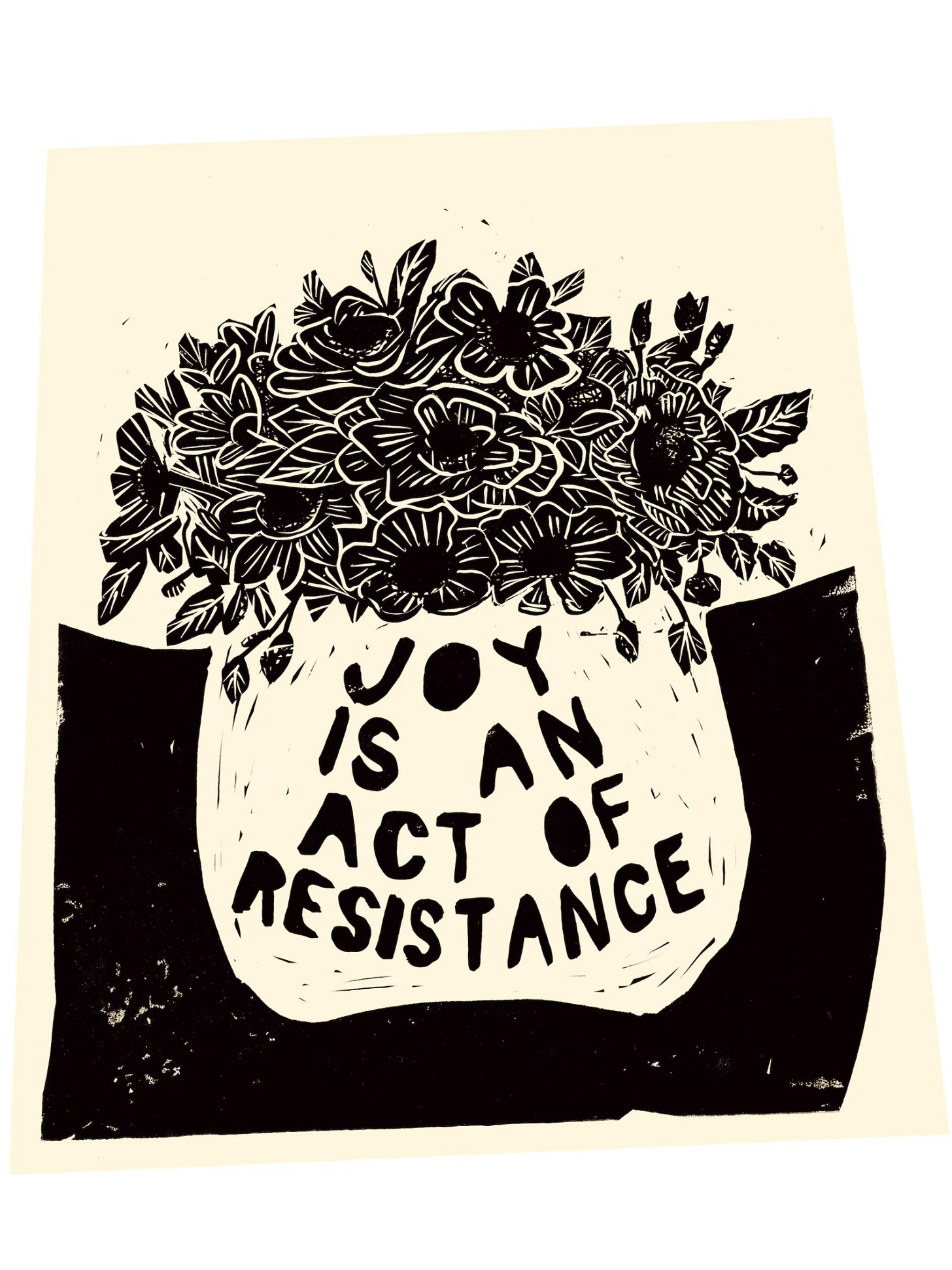This letter is free for you to read, but it wasn’t free for me to create. If you’re interested in reading more letters on Catholic feminism, I would be honored if you would prayerfully consider upgrading your subscription. This publication is only possible because of our generous full subscribers. Full subscribers get access to our entire archive, our summer read along, our monthly booklists, quarterly ask-me-anything sessions, our Advent podcast, and more.
Christmastide is over, and a new year has begun. We’re a couple of weeks into January and I can finally lean back and reflect a bit on how the month of December went. It rushed by in a frenzy of red-and-green days at school and not knowing where the masking tape was. There was merry making and cookie frosting and twinkle-light admiring and all of the good things, but there was also an itchy feeling of get-it-done; a constant buzzing in my ears that sounded a lot like discomfort.
I realized that when I asked others how their Advent was going, and how they were making it through December, it was never answered with a hint of joy or a breathless “I love this time of year!” It was usually responded to with some kind of heaving sigh and a mention of a to-do list. The chaos of “making the holidays special” weighed on moms and the complexity of hard family relationships was wearing on all people. It was hard to flip from the stop-motion animation version of Rudolph the Red-Nosed Reindeer to the news, where bombs were being dropped and hostages were being held.
I noticed this trend online, as well. I’m not sure if I saw a single piece from a Christian writer on leaning into the season or embracing Advent; it was more of a collective sigh of oh, this again. There were so many essays from talented writers about not feeling merry, and about wanting nothing to do with the holidays. How could we, after all? Some people said this with a graceful vulnerability, but others did not. One essay I read that particularly stuck in my gut was one where the writer angrily accused Christians (a group to which they proudly do not belong) of celebrating Advent “like any other year”. Can’t we see the injustice in Gaza, they demanded? Can’t we understand that this is not business as usual?
Business as usual.
The European colonization of the Americas—the one where some of our ancestors cheerfully forced people off their land, gave them fatal diseases, and killed them en masse—resulted in over 8 million deaths.
From 1932 to 1933, the Soviet Union intentionally caused a famine in Ukraine that starved between 3 and 5 million people to death.
In the 1970s the Nigerian Civil War, which began with an ethnic cleansing of the Igbo people, killed between 1 and 3 million people.
I’m currently writing a historical fiction novel that takes place in Paris during World War 2. The research I’ve done would turn your blood to ice.
Human beings wreaking havoc on one another, killing each other in the name of power and land and religion and vengeance and fear, is the most usual business there is.
Every year, I like to pick a scripture verse to memorize. As I’ve vague-written on here many times, the past couple of years have been difficult for me and my verses have tended to be something uplifting from Isaiah. Something about God making a way in the wilderness and not letting me get burned in the fire. This year, however, I found myself drawn towards Psalm 77. It begins as lament: I cried out to God for help. It describes moaning when you think of God, and of wondering how long. Has God forgotten to be gracious? Has he in his anger shut up his compassion?
But about halfway through, the despair turns to conviction. I will meditate on your deeds, it reads.
Your path led through the sea, your way through the mighty waters, though your footprints were not seen.
Your divorce, miscarriage, abusive marriage, lost job, crumbled dream, traumatic childhood—they are all part of your story. Just like Jesus’ death is part of the story, and the Israelites being enslaved is part of the story, and Paul receiving the forty lashes minus one is part of the story. Just like anti-semitism and racism are part of the story, and child refugees being used as political pawns are part of the story, and fentanyl sneaking onto our streets and into our pockets is part of the story. Just like popes accepting bribes and bishops leading the flock astray and priests abusing children are part of the story.
But none of these things are the story.
The story is a resurrected king who promises that under his wings, we will find refuge. And it feels like we, as a collective people, are struggling to remember that in the midst of suffering.
Reader1, I beg you to hear me: I am not inviting you into toxic positivity. Things might be very hard for you and although I’d challenge the notion that global events are particularly bad right now compared to the past, that doesn’t mean they aren’t very hard and that they don’t feel very hard to you and people you love. I am not instructing you to suck it up and sing the carols. I am not instructing you to kick back and ignore the problems of the world because they affect those with less privileges than you. I am not asking you to swallow the pain and smile because, like, Jesus came so it’s all fine.
I’m inviting you to see joy as an act of resistance.
Not the white-knuckled joy of smiling selfies in the midst of a deep pain. But the type of joy that looks like pausing over a hot cup of coffee, or getting together with a dear friend who sharpens you like iron. The type of joy that looks like making French toast on a Saturday morning when you’d rather cry under the covers. Or the type of joy that looks like letting yourself have that nice, long under-the-covers cry you’ve been needing, which is a joy in and of itself. The type of joy that resists the powers of this world and acknowledges the greater truth we stand in the midst of.
If we walk around in a constant state of doom-and-gloom, like that particular writer seemed to be demanding of us, here is the message we’re proclaiming: that destruction is all there is. That evil has won, and that all that’s left for us to do is weep. God is a God of those who are suffering, that is true—blessed are those who mourn.
But God is also a God of delight. He’s a God of beauty and praise and song and starlight. Death + despair are part of the story. But they are not the whole thing.
“What we need is the healed capacity to imagine and believe the profound goodness of the future, to stand in the light of a happy ending whose power reaches into our present and draws us forward in hope.” - Sarah Clarkson, This Beautiful Truth
So to that writer I say: no. I will weep when weeping is called for, but I will rejoice when rejoicing is called for. Yes, I will dance on a Saturday night as bombs fall and COVID steals breath. I will enjoy a bacon-wrapped date stuffed with goat cheese as sadness and hard relationships lurk in nearly every family, including my own. I will sing praise to a God who created libraries and baby elephants and sparkling wine and rivers and Voxer and I will not give into the misery you wear like an ill-fitting cloak. Because God is still king, in the midst of our sorrows. To hand over our joy is to dismiss that fact. There is a time for lament, and weeping, and sorrow. That is part of the story. But it is not the whole thing.
A wise priest (Fr. Joseph Minuth, if there are any Mizzou tigers here) once told me that both the devil and the Holy Spirit whisper to you that you should be holy. But the devil does so in a way that shames and scares—you’re not doing enough, you don’t care enough, you’re not disciplined enough. The Holy Spirit does so in a way that convicts your spirit towards joy and justice.
As part of a Catholic Worker book club last year, I read Dorothy Day: A Biography by William D. Miller. In it, Miller describes the way Peter Maurin (the co-founder of the Catholic Worker movement, alongside Dorothy Day) encouraged people to be announcers, not denouncers. Do you simply point out every injustice you see, or do you take the additional and necessary step of actually announcing the good news?
When I rejoice, I’m creating one pocket of the world where beauty and joy reign. I’m answering the question of How could God allow this? not with apologetics or pessimism, but with a better, brighter answer. Instead of acting as a lawyer on God’s defense team with a long tome about the theology of suffering, I’m choosing to read a picture book all snuggled up with my 2-year-old and lean into the joy of that familial love and connection. I’m choosing to meditate on his deeds.
It’s not toxic. It’s truthful. And it’s the greatest act of resistance you can embark on.
Art by Candace at Space Ink Shop.
I’m currently preparing for one of our quarterly Ask-Me-Anything letters. Got a question about faith, books, feminism, Taylor Swift eras, or anything else that fits your fancy? Leave it in the comments or shoot an email to claire@thecatholicfeministpodcast.com.
On My Nightstand
Everything Sad is Untrue by Daniel Nayeri: This memoir of an Iranian refugee who came to Oklahoma as a child has been on my TBR list for ages and I’m so glad I finally snagged it at the library. I laughed; I cried; I read it in three days.
The Ingenue by Rachel Kapelke-Dale: I absolutely loved this lyrical thriller that takes place in Milwaukee! A piano prodigy returns home to learn that her mother left her stately mansion to a man she knew as a child. The writing is stunning and it’s the perfect amount of creepy.
The Problem With Everything Being Pornified: Yes. Yes. Yes. “Let’s just say I have little patience for those on the left who loudly celebrate women sexualising themselves online, selling it as fun, feminist and risk-free, but are then horrified to hear about 12 year-olds doing the same thing. C’mon. No wonder they want to.
But I also find it frustrating to see some on the right approach this with what seems like a complete lack of compassion. I don’t think it helps to relentlessly ridicule and blame young women for sexualising themselves online. I don’t think it’s fair either. We can’t give girls Instagram at 12 and then be surprised when as young women they base their self-worth on the approval of strangers.”
In case you missed these Letters:
Patron Saint of Hot Messes - for subscribers
Do We Live in a Rape Culture? - for subscribers
What a Tradwife Influencer Taught Me - for everyone
Want to travel with me?
I love taking groups of faithful feminists around the world on pilgrimages. Whether it’s visiting St. Therese’s childhood home in Lisieux or seeing the original Divine Mercy image in Poland, the Catholic Feminist pilgrimages have rocked my heart + strengthened my spirit. See more about our Poland trip here. If you want to be the first to hear when round 3 details are ready, jump on our waitlist.
Lol at my Jane Eyre vibes. I’m going to address you all as “reader” from now on to feel like I’m in a Victorian novel.









"A wise priest (Fr. Joseph Minuth, if there are any Mizzou tigers here) once told me that both the devil and the Holy Spirit whisper to you that you should be holy. But the devil does so in a way that shames and scares—you’re not doing enough, you don’t care enough, you’re not disciplined enough. The Holy Spirit does so in a way that convicts your spirit towards joy and justice."
This right here gave me chills. What a powerful insight. And to your point, when we are shamed and scared we give in to more and more action, thoughtless striving to do and be and achieve - even when it comes to supposed holiness. All of this blinds us to what is right in front of us, the good and the beautiful and the joyful. The small ways we are called by God every day to really be holy. I need to remind myself of this, thank you.
Loved today's essay....the holidays should be celebrated, yet I feel so bogged down every year trying to make them perfect. I'm going to work on that!
And yes, you have at least one Mizzou Tiger subscriber!